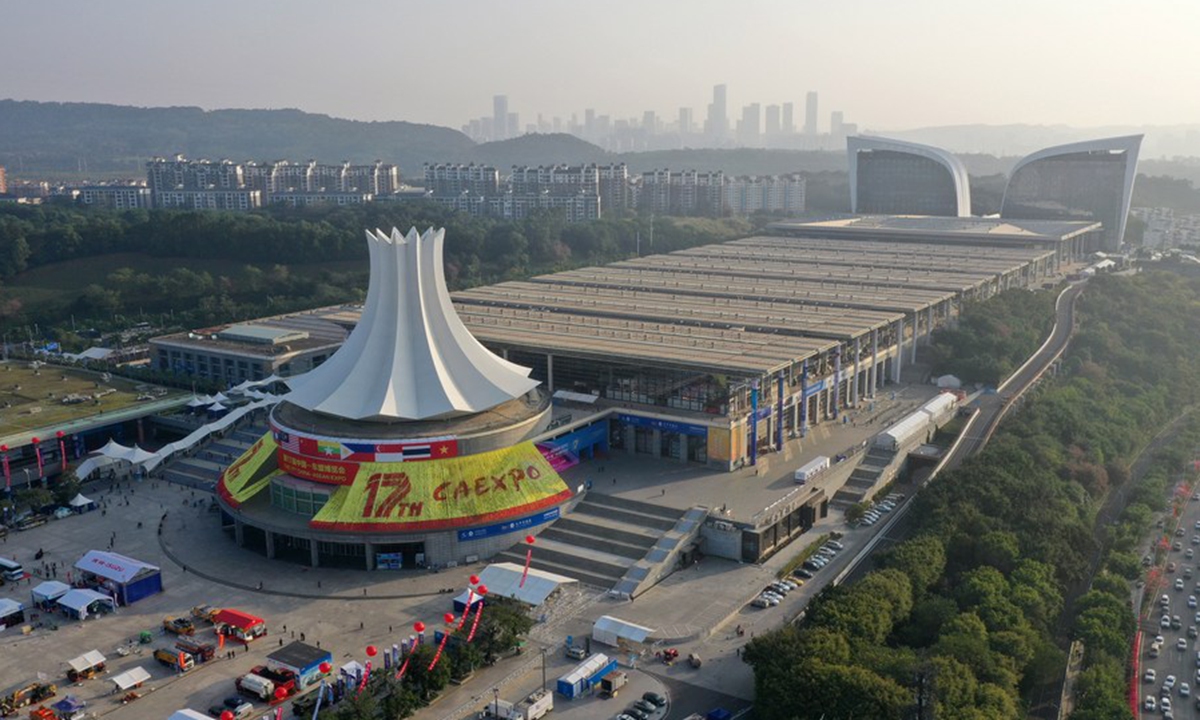Singapore scholar says RCEP injects new impetus into China-ASEAN cooperation
Source: Xinhua Published: 2020/12/7 14:42:47

Aerial photo taken on Nov. 30, 2020 shows a view of the Nanning International Convention and Exhibition Center and its neighboring buildings in Nanning, south China's Guangxi Zhuang Autonomous Region. The 17th China-ASEAN Expo and the concurrent China-ASEAN Business and Investment Summit concluded on Nov. 30, 2020 in Nanning. (Xinhua/Lu Boan)
The signing of the Regional Comprehensive Economic Partnership (RCEP) has injected new momentum into the economic and trade cooperation between China and the Association of Southeast Asian Nations (ASEAN) countries, a Singapore scholar said in a recent interview with Xinhua.
The economic and trade cooperation between China and the 10-member ASEAN countries remains strong despite the impact of COVID-19, said Yu Hong, a senior research fellow of the East Asian Institute of the National University of Singapore, and such kind of cooperation will be bolstered by the inking of RCEP, the world's largest free trade agreement so far.
For the first three quarters of this year, the bilateral trade volume between China and ASEAN has reached 481.8 billion US dollars, making ASEAN the largest trading partner of China, the world's second-largest economy.
"This has demonstrated the resilience of China-ASEAN economic and trade ties, as well as the huge potential of economic and trade cooperation between the two sides," Yu said.
He pointed out that China and ASEAN countries are highly complementary in their industries and enjoy huge potential for cooperation in areas such as infrastructure, digital economy, manufacturing upgrading and trade in services.
The signing of RCEP will help ASEAN countries with advantageous natural resources and labor forces to undertake the transfers of manufacturing industries, so as to accelerate their industrialization processes, he said. This in turn, will help ASEAN countries better integrate into the regional and global industrial chains, and strengthen regional economic integration, he added.
According to Yu, RCEP has injected "strong impetus" for Chinese and ASEAN companies to cope with the COVID-19 pandemic by enabling them more access to the markets in the region.
Yu said ASEAN countries, being optimistic about China's economic prospects and the business opportunities given its vast market, will play an increasingly important role in China's economic and trade relations.
Mentioning the 17th China-ASEAN Expo concluded at the end of last month in Nanning city in south China, Yu said the expo is an important platform for the economic and trade cooperation between the two sides, promoting more ASEAN countries' products to enter the Chinese market, and helping Chinese enterprises better understand the market demand of ASEAN countries and explore business opportunities there.
He said the expo's focus on the digital economy this year complies with the current trend of the development of China-ASEAN economic and trade cooperation.
"China has strong competitiveness and technological advantages in the field of the digital economy, which is also essential for ASEAN countries to accelerate their industrialization process," he said.
Cooperation in this field will become a new driving force for the growth of bilateral economy, trade and investment, Yu said.
Posted in: CROSS-BORDERS